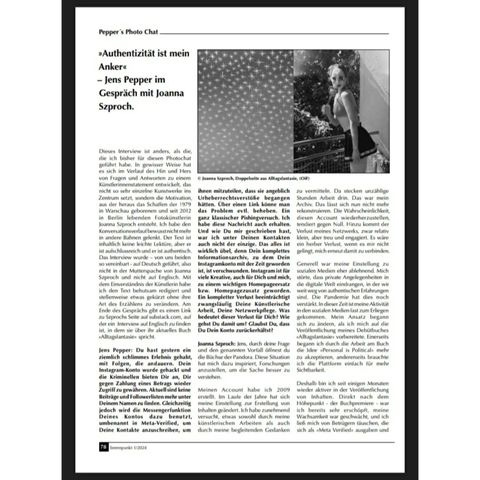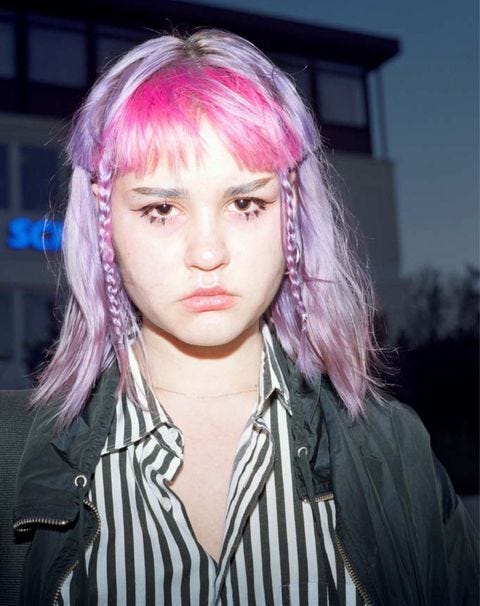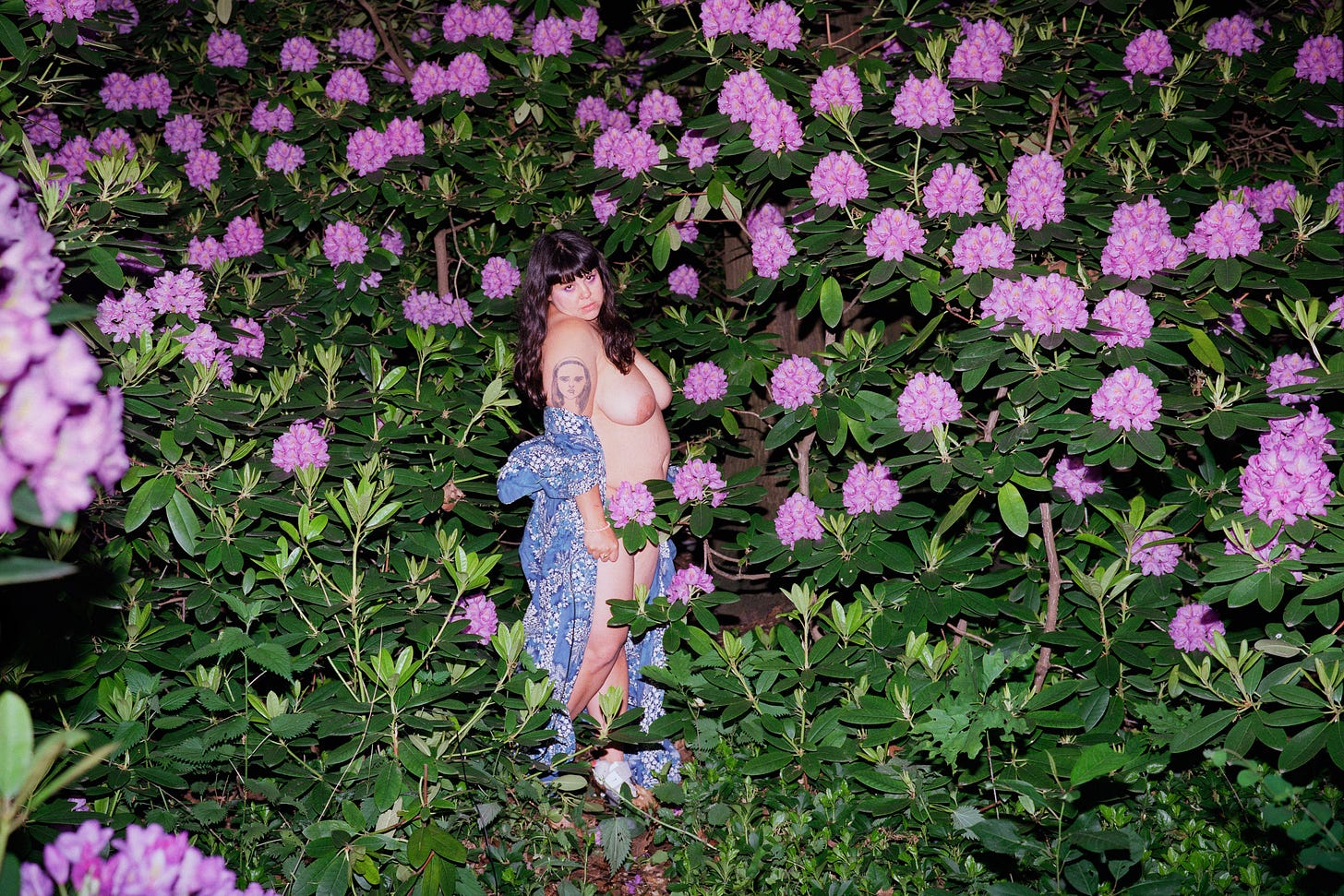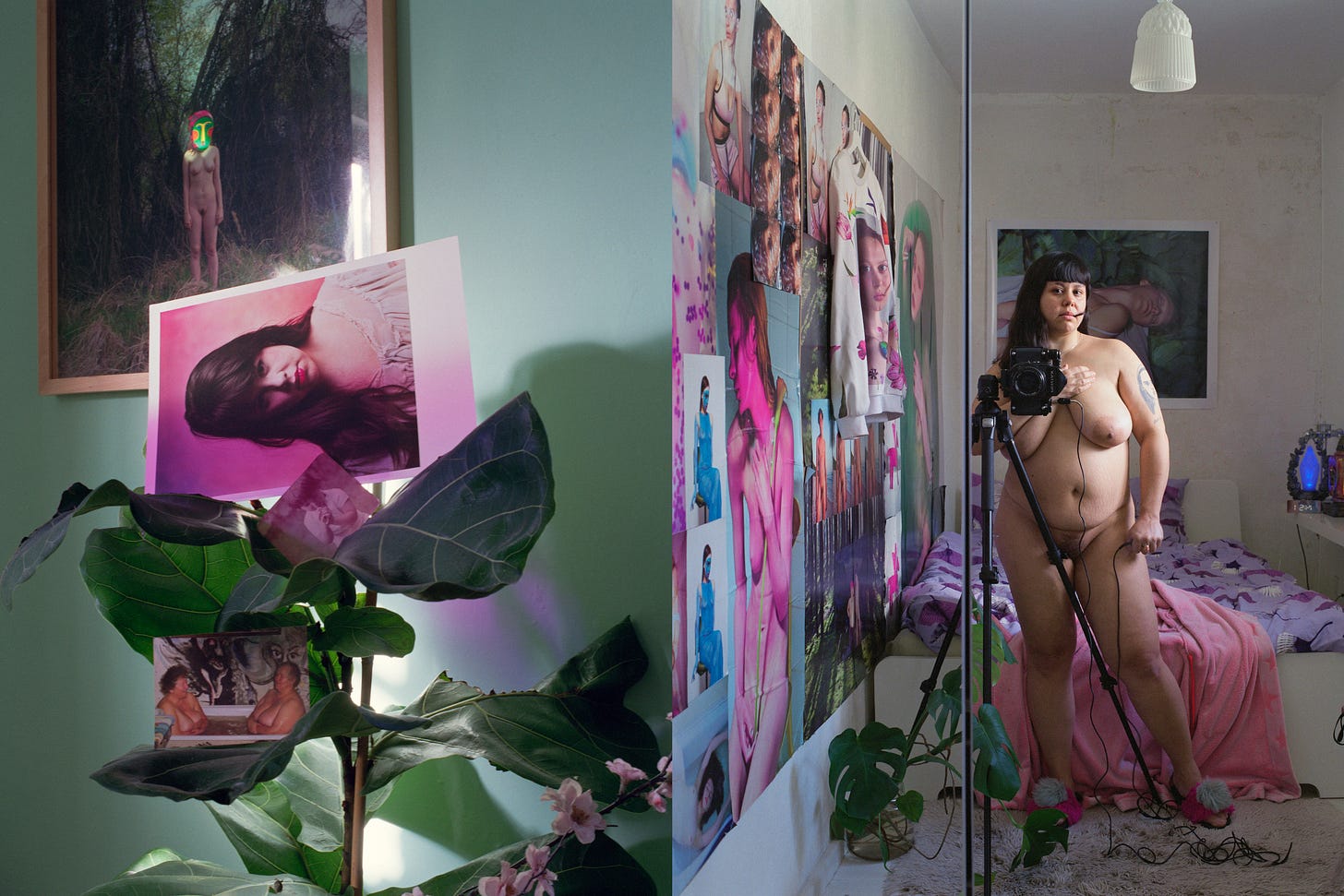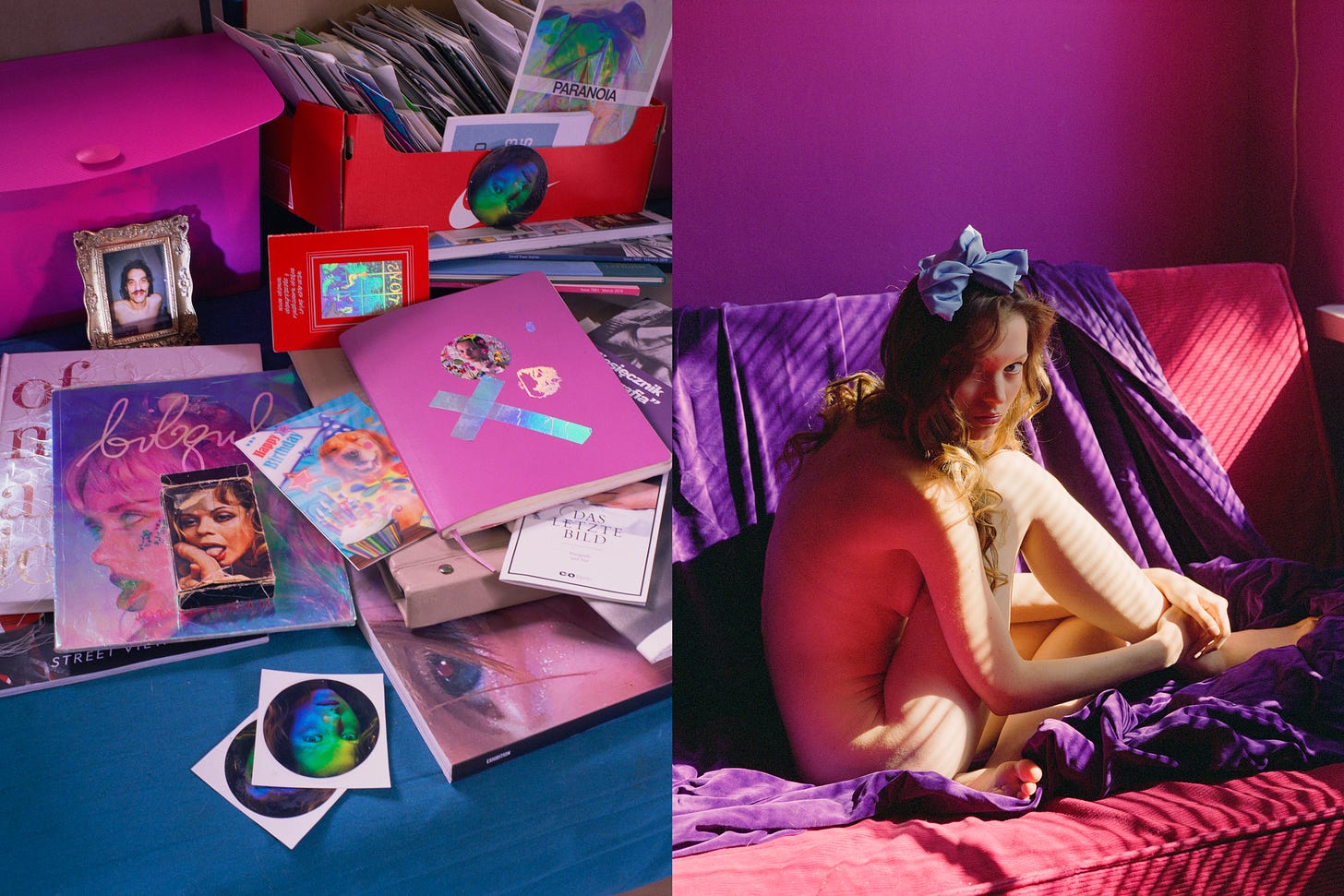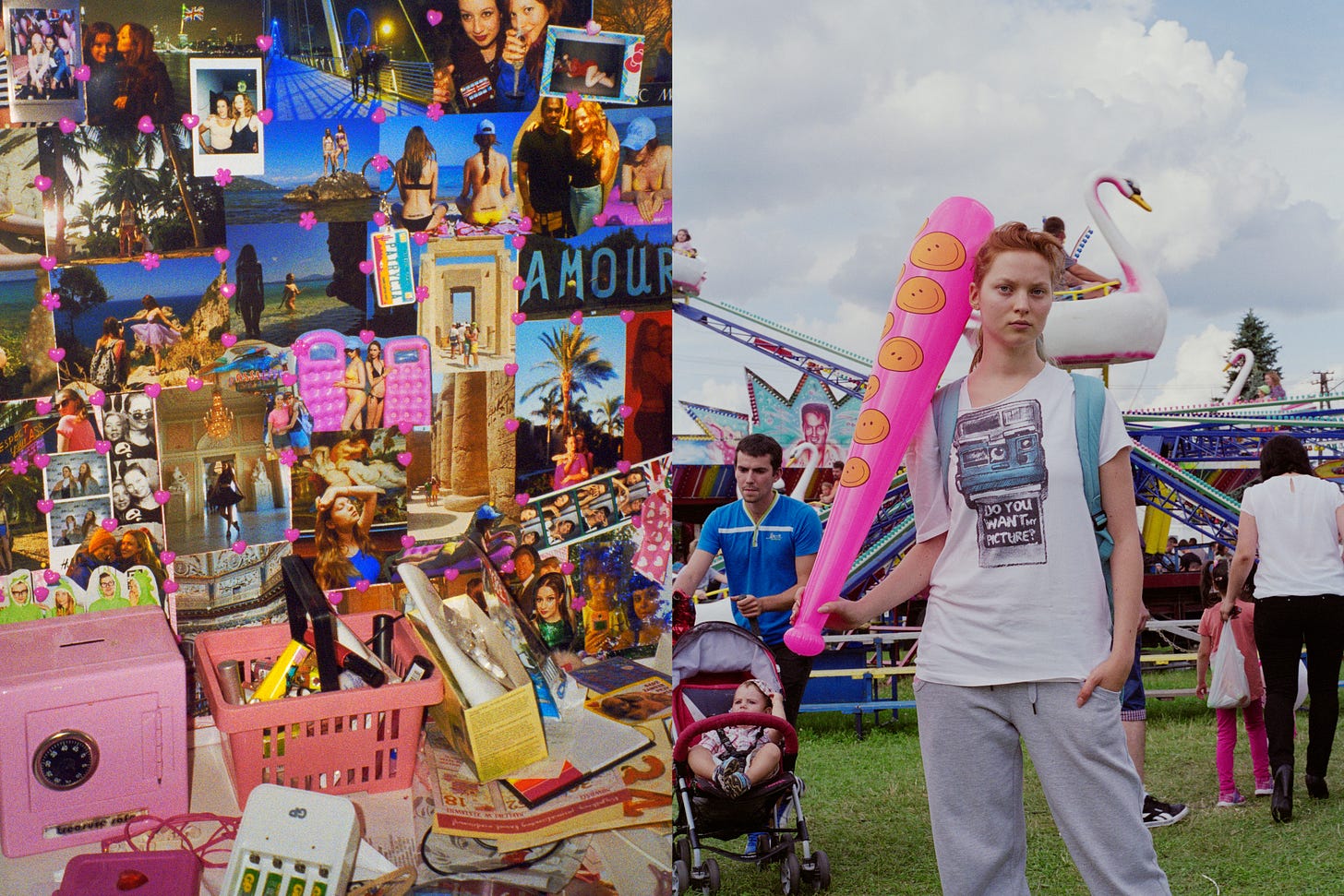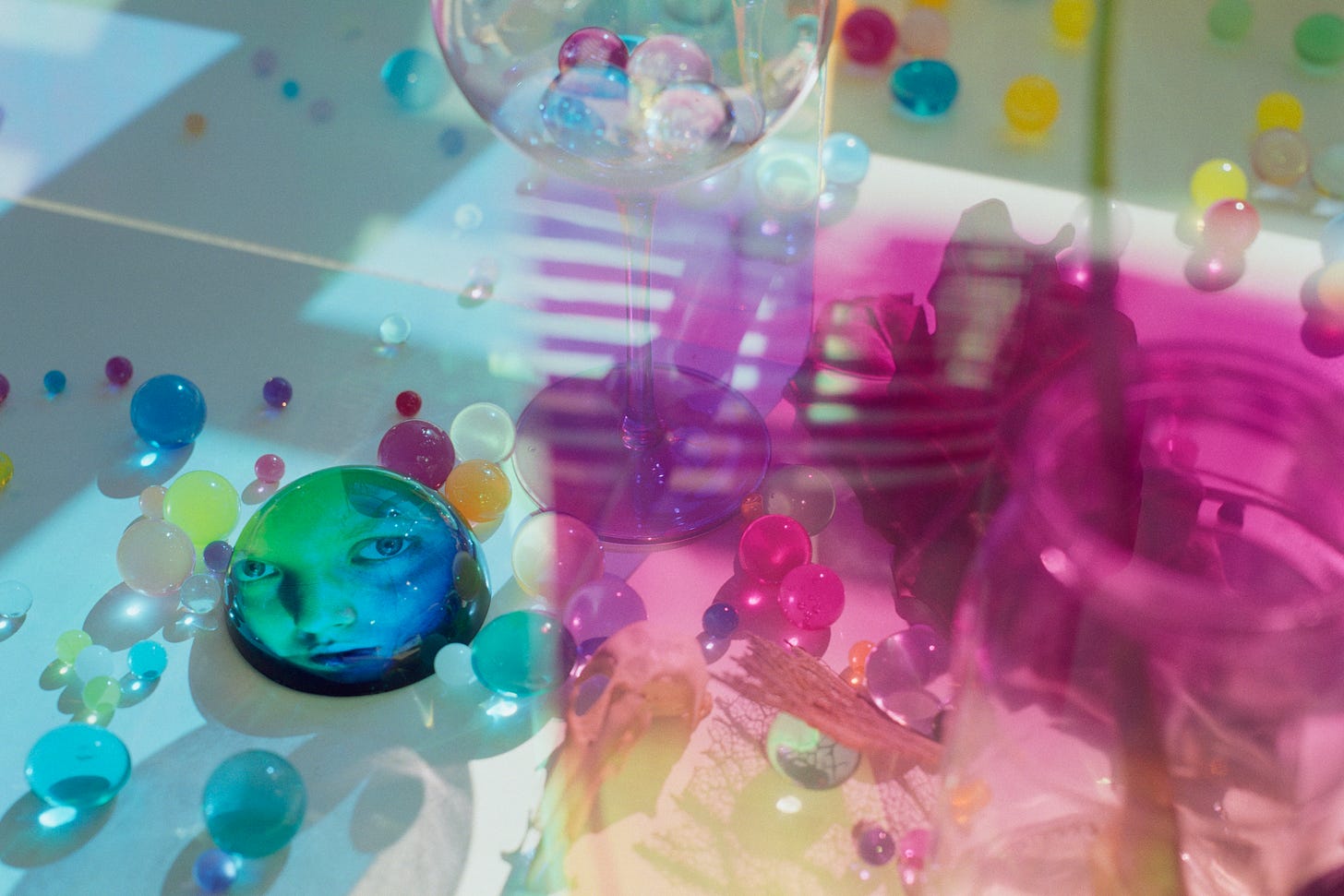Happy New Beginnings, as usual!
Before delving into the main dish, which is my recent interview with Jens Pepper, I'd like to serve you a couple of appetizer announcements.
I hope you don't need to be reminded of the origin of our Gregorian tradition. The idea of starting the year in January comes from the Catholic Church. As you may have already noticed, I appreciate a secular approach to all religions, extracting wisdom from each. However, I harbor skepticism towards the Catholic doctrine, particularly my repulsion for the power of its main control tool ingrained in guilt induction. Navigating diverse spiritual perspectives, I am astonished by the beauty in Christian gospel verses, such as Thou shalt love thy neighbor as thyself. To me, it echoes a simple truth - love others and shunning hate by starting with yourself.
Shifting gears, have you caught wind of the New Year's trend on social media? No judgments, just pondering. Influencers, role models, and celebrities drop self-help/guidance codex for the new year, creating a vibe that we're all missing a preacher’s wisdom. What fuels this phenomenon? Is it a call for heightened ethical consciousness, a longing for lost navigation rules in our postmodern world, or just some virtue signaling? Honestly, I would be delighted to become a mentor, but it seems there are more mentors than mentees, and yet everyone's clamoring for your attention.
So, why not flip the script from "ME ME" to "WE WE"? Instead of another attention-grabbing self-invented recipe, let's create something together. I'm here to propose.
Is "Do unto others as you would have them do unto you" legit? Let's question it, considering our diverse perspectives. This is for everyone, irrespective of age, gender, sex, ethnicity, or class. Soon, I'll dive into the specifics of what's brewing in my mind. Stay tuned for an exciting experiment - my open call to post-modern joyful commandments on how to live and let others live.
Additionally, get ready for another exciting open call to female perspectives. Soon I’ll be announcing another thrilling participatory experiment under the Polyrama’s umbrella! This project envisions debunking sexual double standards and amplifying the underrepresented viewpoint of female fantasy and desire to become unmistakably recognizable in the future through visual stimuli.
Let's speculate and explore our desires, turn-ons, and fantasies, creating new mythology and hypothetical new standards aiming to evolve this venture into a future landmark that addresses female fetish underrepresentation in our daily lives. Starting small with analog encounters, courtesy of the fantastic Polyrama - museum for Life - initiative. Stay tuned for an extraordinary journey!
And finally, before we dive into the main dish, guess what? I stumbled upon the release of my Paris Photo artist talk, and I just have to express my gratitude once again to Marc Feustel from The Eyes. He not only featured my book in the selection of artists but also crafted some fantastic questions, drawing out my best answers. Now, you can all witness this Parisian debut with my debut book Alltagsfantasie!
Speaking of which, the book marked a highlight in 2023, the culmination of 13 years of hard work. I've probably mentioned it a gazillion times, so let's skip the repetition and head straight to my favorite text interview to date. It's the one I had with Jens Pepper, a German photography curator with a special fondness for Polish photography and a great sentiment for Warsaw, the city of my birth.
Joanna Szproch with Karolina Wojtas at Paris Photo ‘23.
“Authenticity is my anchor“
This interview is different from the ones I have conducted so far for this photo chat. In a way, it has evolved into an artist statement in the course of back-and-forth questions and answers, focusing not so much on individual artworks but on the motivation behind the work of Joanna Szproch, a photo artist born in Warsaw in 1979 and living in Berlin since 2012. I consciously did not steer the course of the conversation in other directions. The text is not an easy read in terms of content, but it is enlightening and authentic. The interview was conducted in German, as agreed upon by both of us, not in Joanna Szproch's native language and not in English. With the artist's consent, I have carefully edited and occasionally shortened the text without changing her storytelling style. At the end of the conversation, there is a link to Szproch's page on substack.com, where an interview in English can be found, in which she talks about her current book Alltagsfantasie (Everyday Fantasy).
Jens Pepper
Jens Pepper: You had a pretty bad experience yesterday, with consequences that persist. Your Instagram account was hacked, and the criminals offered to grant you access again for a fee. Currently, no posts and follower lists can be found under your name. At the same time, the messaging function of your account is used, renamed to Meta-Verified, to contact your contacts, informing them that they have allegedly committed copyright violations. The problem could be resolved through a link. A very classic phishing attempt. I also received this message. And as you wrote to me, I was not the only one among your contacts. All of this is nasty because your entire information archive, which your Instagram account has become over time, has disappeared. Instagram has become an important replacement or addition to the homepage for many creatives, including you and me. A complete loss inevitably affects your artistic work and your network maintenance. What does this loss mean to you? How are you dealing with it? Do you think you will regain access to your account?
Joanna Szproch: Jens, with your question and the mentioned incident, you open Pandora's box. This situation inspired me to research to better understand the matter. I created my account in 2009. Over the years, my attitude towards content creation has changed. I increasingly tried to convey something both through my artistic works and through my accompanying thoughts. Countless hours of work went into that. That was my archive. It can no longer be reconstructed. The likelihood of restoring this account tends towards zero. In addition, there is a loss of my network, relatively small but loyal and committed. It would be a severe loss if I fail to reconnect with it.
In general, my attitude towards social media was rather negative. I was bothered by private matters entering the digital world, where we are far from authentic experiences. The pandemic intensified this. During this time, my activity on social media almost came to a standstill. My approach began to change as I prepared for the release of my debut book "Alltagsfantasie."
On the one hand, through working on the book, I began to accept the idea that "personal is political," and on the other hand, I simply needed the platform for more visibility.
Therefore, I have been more active in content publishing for several months now. Right after the peak – the book premiere – I was already very exhausted, my vigilance was weakened, and I was deceived by scammers posing as "Meta Verified" who stole my account. Although I reacted almost immediately and reported it to Facebook and the police, nothing has happened so far.
As a result, I not only learned about the mechanism but also realized that despite the profits it makes through us (advertising, collecting and selling information, and many other questionable practices), Facebook does not provide support to its users.
It not only paves the way for scammers but also for many fraudsters offering help in recovering accounts. It seems almost like a symbiotic relationship. The platform does nothing to stop this; each additional hijacked profile infects more on an international level. I have learned from an institution that some users have lost their accounts, with which they generated their entire income. Now the virus is attacking the artistic network, where many of us have low incomes and not enough resources for expensive IT specialist services. Meta's monopoly ensures that we cannot hope for support because the lack of competition does not promote improvement in services. I am increasingly inclined to permanently leave this platform and look for alternatives (like Substack).
Also, I have the impression that the algorithm works against valuable content. There are many kittens and other animals, but if you post something valuable or, for example, topics related to the emancipation of women or profound political matters, visibility on the internet is minimal – as if it were behind a smokescreen. Unless you are a big fish.
This makes it even clearer to me how we are programmed through controlled information flow.
I wish my message could be more widely spread, but I increasingly doubt whether that is even possible on this platform. But I am just a small fish in a big ocean.
Jens Pepper: Was your account a kind of diary through which one could trace 14 years of your artistic activity and development? We only met since your book presentation, and I didn't have the opportunity to see everything from you on Instagram before it disappeared, so this question.
Joanna Szproch:
I don't want to focus on the past—I feel that the release of my debut book "Alltagsfantasie” is a new chapter in my life as if I broke the script, and perhaps this is a sign from the universe—it's time to start something anew.
Something similar happened to me in the past—my external hard drive crashed just as I was sorting my data and creating a backup. I lost photos of my little daughter and valuable music—I could never recover them. Since then, I've become increasingly skeptical of digital technology.
I prefer the analog—I still shoot on film and will probably continue to do so unless they stop making it.
If something is really important to me, I should print it, which is why I also love the format of a physical book. We are getting more and more entangled in a growing mass of files, bookmarks, and photos. And yes—I practically created my Instagram account at the moment it appeared—I always liked innovations. Now, I'm also looking at new models and considering alternatives—and I dream of an analog alternative.
I'm also thinking of offering a paid zine—but for that, I first need a base of supporters, similar to Patreon or Gumroad.
I know there are also closed groups on Discord. Recently, I've also appeared on Substack because, in addition to visual content, I feel an increasing need to write. But back to your question—so you know what's lost: initially, it was a completely personal profile, without strategy and branding—I posted there what I now only post in disappearing stories. From around 2015/16, I consciously used it as an alternative portfolio to my website. The difference was that most posts with photos from my portfolio—not just snapshots from the iPhone, but analog photos from projects—were somehow connected to my current situation, as my work becomes increasingly autobiographical. They also related to some thoughts on recent situations.
For example, I critically wrote about the Tinder campaign "Single, not sorry", which commodified one-night stands and promoted alienation by convincing us that we only need to take and not give anything.
By the way, this dating app recently celebrated its tenth anniversary, and I read that Tinder is in crisis—users are showing burnout symptoms. So now Tinder has completely changed its strategy and is trying to convince us that finding the other half is the right way, "it starts with swipe". Maybe they changed their minds after reading my post :)))
You see, all this is social programming—we are in the clutches of a digital algorithmic monster and a capitalist machine dependent on dopamine rushes.
I observe and comment on this along with my personal experiences. All of this was before the pandemic. So my photos were always placed in a specific context and accompanied by my somewhat philosophical commentary. Recovering those posts without the time context that they referred to, makes no sense, as they belonged to that particular moment and were a commentary on then-current issues.
I also focused on quality, not quantity, but unfortunately, Instagram follows different rules.
If you don't post regularly, my profile is practically invisible to the algorithm. As I mentioned before, during the pandemic, I stopped posting anything and only felt motivated when the release date of my book was announced. That was around May. Since then, maybe 18 tiles have been added, and all of that is now lost. If I fail to restore my old account and if I still have the motivation to give Meta another chance,
I'm thinking of making my new account even more radical—officially inspired by hacktivism and "personal is political".
I want to continue what became even more crystallized in the last posts about my book. I've addressed a lot on the topics of violence culture and violence because these issues are particularly close to me.
My eternal question is: How can we "hack" this patriarchal and capitalist system? What strategies can we develop for resilience?
I still believe that these strategies do not lie in the addictive pleasures to which capitalism leads us, which dull and disempower us. That's why it's easier to manipulate them.
Only things like pure joy (not to be confused with euphoria), fantasy, and curiosity. Especially women are programmed to feel guilty if they allow themselves to pursue fun things because they are rather expected to cater to the needs of others, and that's also what my book is about—that I'm searching for these things.
Yes, when we met, you asked: Where is the narrative, the script—this story is not read like conventional photographic books. The narrative, more precisely many narratives, which we, together with designer Nora Cristea, have created in a multi-layered way, are meant to break us out of this traditional visual language.
To understand this, you have to forget the known schemas. Open your imagination and senses. This book can't be understood, you have to feel it.
Jens Pepper: Was it not Peter Truschner who asked about the script, and the readability of the images when we met?
Joanna Szproch: Yes—actually, Peter posed the question, but as far as I recall, you expressed interest in it as well. I have the impression that you both were not the first ones to ask a similar question. I see that different people read the book differently, and I believe the reception of the book is very diverse—some even interpret it as a mistake, as if II was unreflective. I'm not talking about you but a specific bookseller.
Sometimes, I feel like people react as if I don't know what I'm doing—being a woman, of course. The selection and sequencing process was lengthy and very deliberate. No coincidence is in there.
Jens Pepper: I see your book as a collection of materials, and collections of materials don't always have to follow a red thread. To me, it seems like an attempt to take stock of one's existence. It appears to be an endeavor to better understand oneself and everything related through the visualization of everyday life, feelings, longings, dreams, etc., by showcasing important people in one's life and self-portraits. This understanding, in turn, may help in planning the future path more clearly. I do this with sticky notes on which I scribble all sorts of things. It helps me comprehend and categorize things. However, I do this without artistic intention. On the other hand, you publish everything in a book. You share private and intimate aspects with strangers. Was that easy for you?
Joanna Szproch: In recognizing the inclination of individuals to overly share about themselves as a result of insecurities or past traumas,
I am intentional about limiting my self-disclosure to what I consider essential and impactful. Understanding the concept that the personal is political, especially in the realm of art, I use this awareness as a tool for playful exploration and processing of societal issues.
Living in a society that often constrains emotional expression, I seek resilience through engaging in activities previously denied or neglected. The myth of normalcy within society imposes oppressive constraints, compelling individuals to conform rather than embrace their true selves. In this pursuit of acceptance, many conceal their authentic emotions and inner worlds, succumbing to societal expectations.
Gender roles further contribute to this suppression, teaching men to hide feelings and women to prioritize serving others over acknowledging their own emotions, resulting in emotional labor.
Despite inherent endocrinological differences, the fundamental cognitive and emotional processes in our brains are shared among all humans.
However, a dysfunctional societal system exacerbates the challenge of taking responsibility for emotions due to a lack of emotional recognition.
Reflecting on these dynamics, particularly post-completing a book, I observe emotional suppression not just from psychological and societal perspectives. Hence, the importance of feelings and the commitment to address them through my art. In my foray into fashion photography, distinct from the factual nature of documentary work, I have honed tools such as imagination and aesthetic sensitivity.
Fueled by my imagination, deeply rooted in the subconscious, my objective is to transform the imperceptible into the visible, placing significant emphasis on context.
This creative process involves spontaneous play, performance, and aesthetic playfulness derived from fashion tools, amalgamating various elements without a rigid plan. Spontaneity is the catalyst for authenticity. Incorporating cultural associations into my authentic life is a practice I cherish, blurring the line between playing something for the sake of being photographed and photographing to genuinely live it. Through my art, I strive to dismantle the barriers to emotional expression and foster a more authentic connection with oneself and others.
Even when presenting deeply intimate and private aspects artistically, my engagement in the act of creation is simultaneous—a playful method of processing complex issues and engaging in self-reflection.
This approach goes beyond showcasing emotions and thoughts; it delves into concepts such as memory, nostalgia, family history, and the interconnectedness of events. Instead of merely proclaiming the validity of my emotional state, I strive to provide a comprehensive context.
Contemplating the development of resilience and self-empowerment, I find room for playfulness and joy in this creative endeavor.
I ponder ways to break free from societal constraints that historically restricted women from certain activities or denied them time. My working process is characterized by intuitive self-exploration—a performance that embodies creation and aligns with my mission.
The fear of judgment, particularly when revealing vulnerability, perpetuates societal hesitancy to openly acknowledge and express emotions.
In my exploration, I delve into shame as a social tool of control, understanding its nuances as a purely social feeling. Maintaining a consistent caution to avoid any semblance of exhibitionism, recognizing it as a form of societal sabotage, I find the intricacies of shame intriguing, especially its role in silencing the discriminated.
Women continually confront judgment about their bodies, the aging process, childbirth, and even when choosing to prioritize themselves. The audacity lies in the fact that we are often denied our sexual agency.
This pervasive societal ownership and judgment not only severely limit women's choices but also contribute to a wider disconnection from their emotions, leading to chronic diseases.
It's time to boldly challenge and dismantle these outdated narratives that hinder women from fully embracing their autonomy and emotional well-being. I believe shame should be a consequence of wrongdoing, not something tied to aspects beyond one's control such as aging or perceived attractiveness.
Refusing to position myself as a victim, I assert my agency through my voice.
I emphasize personal agency and leverage my voice to challenge societal norms. This viewpoint is not egocentric; rather, it highlights the invisibility many women experience. Our mission should be to bravely share our private struggles with a broad audience, fostering understanding and empathy. If we don't take up this responsibility, who else will comprehend our experiences? Personal narratives, even when uncomfortable, disrupt established norms and compel individuals to confront uncomfortable truths.
The looming specter of judgment, a formidable barrier to exploration, restricts both understanding and personal growth.
This struggle is particularly pronounced in well-known Eastern European mentalities, deeply rooted in places like Poland (my origin), where societal opinions often carry more weight than personal authenticity. I, for one, could never conform to this, and I believe I was always inherently different. It's a badge I wear proudly now, but there were moments in my journey when I grappled with feelings of inferiority. The real turning point for me was when I couldn't conceal my truth. I had to speak out about my reality; it became a necessity.
My sanctuary isn't a place of blind obedience; it's where I feel safe and free to be the real me.
So here I am, in Berlin. Despite the love-hate dynamic, I've found the opportunity to explore and express myself more freely. I'm challenging the norms that dictate we should be silent and blindly follow.
Authenticity is my anchor, and I'll proclaim it loudly, proudly asserting my right to be genuine in a world that often pressures everyone to conform.
By the way, the thing that repulses me the most is judgment.
Judgment is a full stop. If there's judgment, there's no room for exploration.
Jens Pepper: What you just shared can be understood as the theoretical foundation for your book, and for your photographic and artistic work. But do you believe that the viewers of the book and your art can understand your motivations without explanation? Do you have any expectations for the readers and viewers?
Joanna Szproch: This theoretical layer is indeed a deeper level of understanding, even for me. It has continued to evolve, especially as I witness the reception of my book by its beholders.
Expectations? I try to remain free of them, but everyone carries them. Regarding how the beholder interprets it, I respect their autonomy. I don't seek to impose how they should perceive my message. The only suggestion is to engage with the book on a sensory and associative level, rather than trying to grasp it as a linear narrative.
I see this as a risk, aiming to challenge the conventional way of experiencing a book. It's not about following a rigid path but feeling the invisible threads that weave through the pages. It's like life's serpentine journey, sometimes spiraling, repeating but always ascending in initiation. There are numerous narratives, some individual images conveying entire stories, while others act as connectors. I consider myself a multi-layered orchestra of sensuality, intelligence, and keen observation. My sensitivity to color and sensory elements is distinct. Everyone possesses a unique sensitivity, and it's beyond my control how universally accessible my work is.
What matters is that it resonates with those who engage with it.
This book will reveal different facets to each beholder, and I don't seek to dictate interpretations. Regrettably, some may see undesirable themes in it, like the Lolita-like fantasy. I find this disheartening, as I express my perspective through innocent and symmetrical eroticism. I won't impose my beliefs or resort to prohibition.
I aim to show alternative perspectives and encourage open-mindedness.
I hold a deep appreciation for art that unveils historical and cultural discrimination against women and its harrowing consequences. Having experienced violence personally, I find strength not in reminders of suffering but in transcending it.
My fantasy world is a sanctuary where I free myself from toxic patterns and reflect my needs and desires. It is my political manifesto, a remedy for suffering.
I don't advocate pursuing shallow euphoria but rather the genuine joys found when we connect with others, remain open-minded and perceive the world with all our senses. It can also serve as a remedy for overconsumption.
The journey of creating this book was an arduous path of self-discovery, and I'm deeply grateful to designer Nora Cristea (Preggnant Agency) for helping me unearth my essence.
I hope my book reaches those who resonate with it. This multi-layered process of creation involves shaping material, interpreting it, and finding meaning. I'll continue to use my expressions with greater consciousness and precision. It's akin to crafting my unique language, based on borrowed associations, imbued with new meanings. In an era of information overload, let's not rush. I'm confident that the book is my medium, and I'll continue in this form. While the next one may require years of waiting, for now, let's savor the present book, discovering its layers, and understanding that one viewing may not be enough for full comprehension.
My book Alltagsfantasie is available at André Frère's Online store and selected bookstores.
The original German interview is now available in both PRINT and PDF versions on the Brennpunkt Magazin’s website, as well as in select bookstores. Dive into the pages and explore the insights captured in our conversation!
Joanna Szproch interviewed by Lady Gaby about Altagsfantasie - her debut artist photo book.
Wordbank Radio Show by Lady Gaby Gaby: Today, I'm excited to introduce our guest, Joanna Szproch, a photographer and visual artist originally from Poland and a long-time resident of Berlin. She has poured years of effort into her life's work, which has now been beautifully encapsulated in a book. This book is a vibrant, tactile masterpiece with a mirror-…










